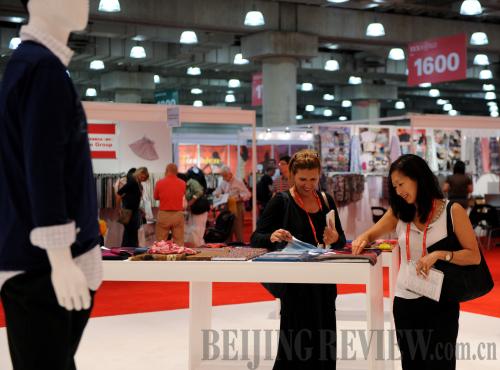|
 |
|
DRESSING UP THE WORLD: Two ladies browse Chinese textiles at the 11th China Textile and Apparel Trade Fair held in New York City in July 2010. The fair is the biggest textile procurement fair in North America (SHEN HONG) |
The WTO Appellate Body on March 11 issued its decision in a challenge brought by the Chinese Government to several anti-dumping and countervailing duty investigations conducted by the United States. The decision confirms anti-dumping and countervailing duty orders by the United States on imports of new pneumatic off-road tires, circular welded pipes, light-walled rectangular pipes and tube and laminated woven sacks from China were inconsistent with WTO rules.
With the decision made, the anti-dumping and countervailing duty investigation by the United States against China, which has lasted five years, must be closed. Since some other countries have followed the United States in carrying out anti-dumping and countervailing duty investigations against China, the WTO decision may act as a deterrent against such action.
On March 12, Li Chenggang, Director of the Department of Treaty and Law of the Ministry of Commerce (MOFCOM), said China welcomed the ruling and hailed it as a victory against further trade disputes. "China demands the United States correct its unfair use of trade measures and ensure fair competition for Chinese companies," Li said.
The case
From July 2007 to September 2008, the United States imposed anti-dumping and countervailing duty measures on four product categories imported from China: new pneumatic off-road tires, circular welded pipes, light-walled rectangular pipes and tube and laminated woven sacks. Overusing these investigations has brought serious difficulties to the development of related Chinese industries. To eliminate discriminative trade protectionism measures, China challenged the U.S. measures in the dispute settlement body of the WTO on September 19, 2008.
According to information from MOFCOM, after China brought WTO action against the United States, consultation procedures started, but achieved no results. On October 9, 2008, China requested a panel be established, but the two countries were unable to reach an agreement on the members of the panel. Finally three experts selected by the WTO director-general formed the panel on March 4, 2009.
The biggest argument surrounding the case is that the United States viewed China as a non-market economy and that Chinese state-owned enterprises and banks are public bodies instead of independent business entities. The allegations included that when applying for land use rights, these production enterprises pay prices lower than the average market prices, hence obtaining disguised subsidies. The United States holds that products from China received subsidies during production, so it imposes high countervailing duties upon Chinese products while collecting anti-dumping duties.
On October 22 last year, the WTO panel issued a ruling. Although the WTO's dispute settlement body found that the U.S. Department of Commerce had acted inconsistently with WTO rules on five elements of the case, it rejected most of China's contentions. China appealed the WTO panel ruling later on December 1.
The decision by the appellate body of the WTO reversed key points of the earlier WTO panel decision: the WTO appellate body ruled that the U.S. Department of Commerce wrongfully applied laws to label Chinese state-owned enterprises as "public bodies" and raw materials provided by such enterprises as "governmental financial support," and that the practices of the U.S. side were unfounded and inconsistent with WTO agreements.
The decision by the appellate body of the WTO also supported China's claims to "double remedies," saying that the United States is inconsistent with WTO rules to apply countervailing duties to Chinese firms on the basis of a non-market economy methodology while imposing anti-dumping duties on Chinese products.
The appellate body recommended the dispute settlement body of the WTO request the United States to bring its measures into line with the Agreement on Subsidies and Countervailing Measures.
Unlikely to improve
Industrial insiders think the WTO decision will not alleviate trade protectionist actions against China.
According to the MOFCOM, early in 1984 the U.S. Department of Commerce decided that anti-dumping and countervailing measures should not be adopted simultaneously. In 1986, the U.S. Court of Appeal also confirmed this principle. However, since 2007, the U.S. Department of Commerce has departed from its usual practice and adopted simultaneous anti-dumping and countervailing duty measures against products from China.
| 